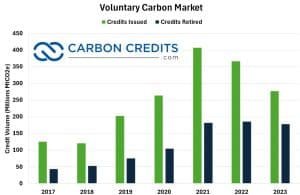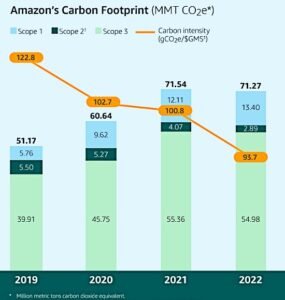Amazon has taken a bold step by becoming the first company to sidestep the global standard for verifying carbon offsets, a standard developed by a non-profit heavily funded by Amazon’s founder, Jeff Bezos. This move is part of Amazon’s strategy to establish a new standard, enabling it to overcome the shortage of quality-labeled offsets and meet its ambitious goal of net zero greenhouse gas emissions by 2040.
However, this decision has raised concerns about potential market confusion and the dilution of carbon offset standards.
Redefining Carbon Offset Standards
Companies, including Amazon, purchase carbon offset credits from projects that absorb carbon, such as reforestation, to offset their emissions. Each carbon offset corresponds to a tonne of carbon dioxide reduced or removed from the atmosphere.
Since the critic of the carbon offsets’ integrity began to scrutinize the market in 2021, the volume of these credits issued decreased.
Despite the demand, the market for these offsets remains small due to a limited number of verifiable projects.
To address this, Amazon has completed work on Abacus, a new framework for verifying carbon offsets, developed in partnership with carbon registry Verra. They started developing this carbon offset standard in 2022.
This alternative standard is positioned as more ambitious than the one developed by the Integrity Council for the Voluntary Carbon Market (ICVCM). ICVCM is the largest organization dedicated to validating carbon offsets.
Amazon’s head of carbon neutralization, Jamey Mulligan, who is also the architect of Abacus, stated that while the company supports ICVCM’s work, it seeks a higher standard to ensure real and verified impacts on emissions. He did not comment on whether Jeff Bezos was directly involved in this decision.
Other major tech companies like Alphabet, Meta, Microsoft, and Salesforce have already committed to purchasing up to 20 million metric tons of Abacus-certified credits.
However, the ICVCM has expressed concerns about the development of an alternative standard. Pedro Martins Barata, co-chair of ICVCM’s panel of experts, worries that multiple standards could lead to confusion in the market.
Kelley Kizzier, a member of ICVCM’s board and director of corporate action at the Bezos Earth Fund, views Abacus as complementary rather than competitive to ICVCM, emphasizing the need for generating high-integrity offsets.
Meet Amazon’s “ABACUS”
The market for voluntary carbon offsets, valued at $2 billion, remains constrained by skepticism over the effectiveness of the underlying projects. According to an Environmental Defense Fund analysis, the market currently offsets 300 million metric tons of emissions annually, but only a fraction of these offsets are verified. ICVCM’s primary quality label, CCP, covers only 27 million tons.
Last month, the organization revealed the first carbon-crediting methodologies approved for its Core Carbon Principles (CCPs) label.
Amazon reported 71.3 million tons of carbon emissions in 2022, with the majority stemming from its supply chain. The company plans to become a significant buyer of carbon credits without substituting these credits for its broader decarbonization efforts. Amazon is evaluating over 70 proposals and aims to restore tens of thousands of hectares of degraded land.
Any developer meeting Verra’s methodology can apply for the Abacus label, which was developed with input from scientists, NGOs, and industry experts. Eron Bloomgarden, founder of Emergent, believes that while ICVCM’s work is crucial, it is insufficient for the market’s growth. He supports Abacus as it could help address major challenges like climate change and biodiversity extinction.
What Makes Abacus Different?
The new carbon credit label, Abacus, focuses on agroforestry and reforestation projects due to challenges with additionality, leakage, and durability. These projects have significant potential for climate, social, and environmental benefits.
Additionality: Abacus differs from traditional carbon credits by requiring developers to account for additionality from the project’s inception. They must track changes in carbon stock over time using a dynamic baseline, ensuring projects outcompete control plots in the surrounding landscape. This shifts the risk of non-additionality to project investors.
Leakage: Abacus aims to reduce leakage, which occurs when agricultural projects indirectly cause land-use changes and carbon loss. By supporting projects that make degraded land or nearby regions equally productive, Abacus helps maintain agricultural production rates, ensuring that carbon removal efforts do not compromise food security.
Durability: To address the issue of durability, Abacus continues using pooled buffer accounts to cover potential losses due to events like wildfires or harvests. However, it shortens the crediting period from 50 years to 30, which has minimal impact on investors’ financial outlooks. This change creates unaccredited removals that can compensate for partial losses, acting as an additional buffer pool.
In summary, Amazon’s development of the Abacus standard represents a pivotal move in the carbon offset market, aiming to enhance the supply of high-quality offsets while stirring debate about the implications for market coherence and the integrity of carbon offsetting practices.



